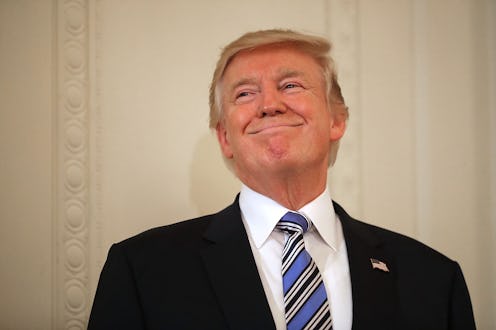News
Trump & The ‘NYT’ Are Arguing About What Happened In Their “Fake News” Meeting

President Donald Trump recently revealed he'd discussed "the vast amounts of Fake News being put out by the media" in a private meeting with the publisher of the New York Times. But now, the publisher of New York's Gray Lady has said that's not what happened at all. New York Times publisher A.G. Sulzberger pushed back on Trump's account of their meeting Sunday, saying he warned the president his anti-press rhetoric would lead to violence.
In a tweet published Sunday, Trump said he'd had "a very good and interesting" meeting with Sulzberger at the White House. The president then appeared to imply that Sulzberger had shared his opinion of so-called fake news. "Spent much time talking about the vast amounts of Fake News being put out by the media & how that Fake News has morphed into phrase, 'Enemy of the People.' Sad!" he wrote.
But in a lengthy statement issued in response to Trump's tweet, Sulzberger said he'd accepted an invitation to meet with the president in order "to raise concerns about the president’s deeply troubling anti-press rhetoric." According to the Times, Sulzberger and Editorial Page editor James Bennet went to the White House, at the president's invitation, on July 20 for what was supposed to be an off-the-record meeting.
"With Mr. Trump's tweet this morning, he has put the meeting on the record, so A.G. has decided to respond to the president's characterization of their conversation," the Times said in a press release containing Sulzberger's statement.
In his own account of their meeting, Sulzberger said he'd made it clear to the president that he thought the phrases "fake news" was "untrue and harmful." Sulzberger also said he'd communicated his concerns about the president's penchant for labeling journalists as "the enemy of the people."
"I told the president directly that I thought that his language was not just divisive but increasingly dangerous," Sulzberger said. "I warned that this inflammatory language is contributing to a rise in threats against journalists and will lead to violence."
Sulzberger said he "repeatedly stressed" to the president that his anti-press rhetoric was "being used by some [foreign] regimes to justify sweeping crackdowns on journalists."
"I warned that it was putting lives at risk, that it was undermining the democratic ideals of our nation, and that it was eroding one of our country's greatest exports: a commitment to free speech and a free press," he said.
But while Sulzberger urged the president to rethink his use of such anti-press rhetoric, he said he wasn't asking Trump to stop criticizing the New York Times specifically. "Throughout the conversation I emphasized that if President Trump, like previous presidents, was upset with coverage of his administration he was of course free to tell the world," Sulzberger said. he added that he'd repeatedly emphasized to the president that was not asking for him to "soften his attacks on The Times" if he thought the paper's coverage was unfair.
"Instead, I implored him to reconsider his broader attacks on journalism, which I believe are dangerous and harmful to our country," he said.
In comments to the Times, Sulzberger described his meeting with Trump as "cordial."